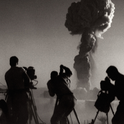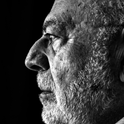Channel 4 went big on Britz, describing it as must-see, water-cooler television for the post-7/7 generation. I was happy to give up four hours to see anything that Peter Kosminsky had written and directed. The Government Inspector, his thoughtful, sparse telling of the death of David Kelly was one of the highlights of 2005.
But I was disappointed by Britz—on three levels. First, I didn't find it convincing as a drama. It's a big ask, to make a suicide bomber personable and likeable, and Nasima didn't convince me. In fact, I found the characterisation of all the major parts extremely thin. The dialogue was either staged and didactic—the scene featuring Sabia's solicitor, where control orders were explained in painful detail, was particularly excruciating—or non-existent. The drama lurched between these two extremes.
Then there was Kosminsky's interpretation of the political context, within which we were expected to view the journey Nasima took from medical student to suicide bomber. Early in the drama, she spurns leaflets from radical Islamists on campus and clads herself in tight western clothing. Just a little later she is embracing jilbab and hijab, and being radicalised by the experience of being arrested and threatened with ham sandwiches by thuggish cops. This was goodie-baddie television—surely not the way to explore the intricacies of the war on terror. Nasima's brother's journey in the opposite direction was equally simplistic. Would a second-generation Pakistani student so enthusiastically defend control orders? Would he pitch up at MI5 ready to take his place in the war on terror quite so quickly? And would MI5 employ him so readily, and know so little about the company he kept? And, for that matter, would Nasima's mouthy student friend, Sabia, really end up on a control order (which we were expected to believe led to Nasima's radicalisation)? Given that there are currently fewer than 20 control orders, and that MI5 estimated last year that thousands of British Muslims are actively involved in extremist politics, it seems unlikely that one firebrand would end up gagged merely for running a few demonstrations and having a badly behaved brother. Then there was the plot device of making the sister a suicide bomber. There have been just a handful of women suicide bombers, and none in this country. It would have been far braver to stick to reality—that almost all suicide bombers are men—even if it meant working harder at making a male suicide bomber attractive.
Intelligence services agree that there is no profile for suicide bombers—they can be rich, poor, educated or ignorant. But they do agree on the triggering factors for radicalisation—Bosnia, Chechnya, Afghanistan and of course, Iraq. They also agree that the internet—now that mosques and campuses are heavily monitored—is the key radicalising medium. None of this was conveyed in Britz. I spent much of last year talking to British Muslims, many of whom had made their own journeys through radicalisation and out the other side, about the motivating factors for their politicisation. None of them mentioned control orders or other anti-terror legislation—although many were outraged by the war on terror on Muslims abroad. Factual drama has to stick to the truth if it is to be convincing. Britz has had an easy ride from British critics, fearful, it seems of insulting Islam. I think we have to be braver than this. When I travelled to Iran to visit my family earlier this year, I was surprised and heartened by the textured discussion of the war on terror. No one felt that it was wrong to question both Shia and Sunni involvement in terrorist acts, even though they were also critical of American and British actions. No one comes well out of the war on terror. There are no goodies and no baddies—only shades of grey.
Twenty years ago, a political drama, Edge of Darkness, set the standard for television thrillers. Britz fell far short. Edge of Darkness demolished the British state and the evil of the military-industrial complex, and it did so through compelling characterisation. Drama can bring us closer to reality. But Britz failed. Because whatever the British state is responsible for, here and abroad, killing innocents is wrong. The ill-judged rant at the end by Nasima sought to justify the unjustifiable, as did the statements excoriating the iniquities of the British state, rolling over a black screen at the conclusion. This was propaganda, not drama, and it leaves a bad taste in the mouth.
The failure of Britz (2)
November 05, 2007












